Japan's PM cancels India visit amid Assam unrest
Two people have been killed by police in Assam amid protests against controversial new citizenship rules
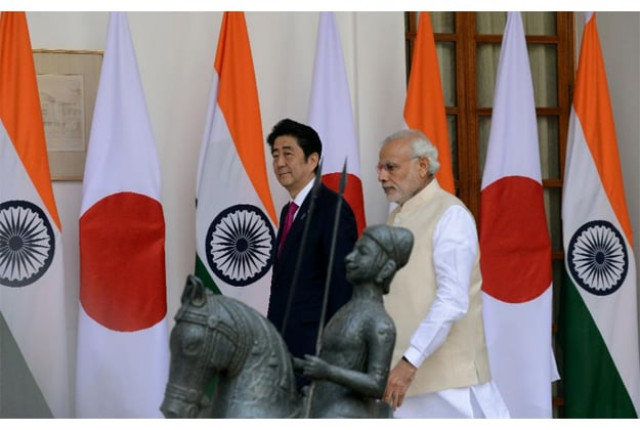
India's Prime Minister Narendra Modi walks with Japan's Prime Minister Shinzo Abe at Hyderabad House in New Delhi on December 12, 2015. PHOTO: AFP/FILE
Two people were killed in Assam state on Thursday when police opened fire on people protesting against India's controversial new citizenship rules.
The new law lays out a path of Indian citizenship for six minority religious groups from neighbouring Bangladesh, Pakistan and Afghanistan, which protesters in Assam say would convert thousands of illegal immigrants into legal residents.
Modi had planned to host Abe in Assam beginning Sunday as part of a campaign to move high-profile diplomatic events outside Delhi to showcase India's diversity.
Indian president disregards protests, signs citizenship bill into law
"With reference to the proposed visit of Japanese PM @AbeShinzo to India, both sides have decided to defer the visit to a mutually convenient date in the near future," Indian foreign ministry spokesman Raveesh Kumar said in a tweet.
With reference to the proposed visit of Japanese PM @AbeShinzo to India, both sides have decided to defer the visit to a mutually convenient date in the near future.
— Randhir Jaiswal (@MEAIndia) December 13, 2019
Japan has stepped up infrastructure development work in Assam in recent years, which the two sides were expected to highlight during the summit.
Abe had also planned to visit a memorial in the nearby state of Manipur where Japanese soldiers were killed during World War Two.
A movement against immigrants from Bangladesh has raged in Assam for decades. Protesters say granting Indian nationality to more people will further strain the state's resources and lead to the marginalisation of indigenous communities.
Bhaskar Jyoti Mahanta, Assam's police chief, said that there had been no clashes between protesters and police on Friday.
"Things look better definitely today ...(but) forces are all deployed everywhere," he told Reuters.
Bangladeshi FM cancels India visit amid protests
Bangladesh's foreign minister on Thursday cancelled a planned visit to New Delhi amid protests in northeastern India over controversial changes to the country's citizenship bill.
Abul Kalam Abdul Momen was scheduled to reach India on Thursday to attend two high-level conferences and hold talks with his Indian counterpart Subrahmanyam Jaishanker.
Bangladesh tried to downplay this urgent cancelation.
"He has a jam-packed schedule due to victory month programmes including December 16 Victory Day and that's why he has cancelled his scheduled India visit," Tohidul Islam, a senior information officer of Foreign Ministry, told Anadolu Agency.
A lower-level diplomat will represent Dhaka in New Delhi instead of the foreign minister, Islam said, denying that the citizenship bill had anything to do with it.
Meanwhile, Home Minister Asaduzzaman Khan was scheduled to travel Friday to the northeastern Indian state of Meghalaya on invitation by chief minister Conrad Kongkal Sangma.
"We do not want to call it cancellation,” public relations officer of the ministry, Sharif Mahmud Apu, told Anadolu Agency. “Rather, we prefer to say postponement as our minister is expected to visit Meghalaya in a convenient time later."
Because of unrest in India regarding a citizenship amendment bill, the environment is not "in favour of a bilateral tour,” he said. "We hope that this visit will be held at any convenient period in January or February in the coming year.”
Indian media covered the cancelation of the visits by its close regional ally in light of rising political tension in the region.
India’s parliament Wednesday passed a bill that would grant citizenship to six minorities from Afghanistan, Pakistan and Bangladesh - all Muslim-majority nations in South Asia. It only needs a signature by the president to become law.
The bill was coupled by statements by Indian officials saying minorities in the three countries were not safe that drew strong reactions from Bangladesh.
Momen said Tuesday that India was losing its secular character by making religion a basis for citizenship and excluding Muslims from the list.
Citing the new amendment to citizenship bill as discriminatory and ethnically biased, Delwar Hossain, professor of International relations of Dhaka University, told Anadolu Agency that the bill cannot be anywhere of the world.
"It's such a controversial and partial bill that has been rejected by Indian people," he opined, adding that Bangladesh should stay alert about any adverse impact of it as India’s home minister has already accused Bangladesh of abusing the rights of minorities.
Meanwhile, in the backdrop of violence and curfew in India's state of Assam following the adoption of the Citizenship Amendment Bill, security has been heightened at the Bangladesh Assistant High Commission in Guwahati, according to a foreign ministry statement Thursday.
Referring to an attack on a convoy of the Assistant High Commissioner in Guwahati and vandalization of two signposts of the mission, Indian High Commissioner to Bangladesh Ms. Riva Ganguly Das has also been asked to ensure the security of Bangladeshi diplomats, the statement added.

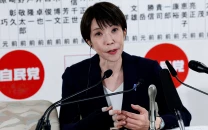
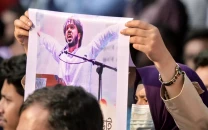

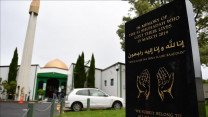

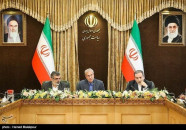












COMMENTS
Comments are moderated and generally will be posted if they are on-topic and not abusive.
For more information, please see our Comments FAQ